
ABC Carnival '74
Across the Board
Baloney
Bamboozle
Be What You Want
Beat The Genius
Beat The Odds (1962)
Beat The Odds (1975)
Bedtime Stories
The Better Sex
The Big Money
The Big Payoff
Big Spenders
Blank Check
Body Language
Body Talk
The Buck Stops Here
Bullseye
Call My Bluff
Card Sharks (1996)
Casino
Caught in the Act
Celebrity Billiards
Celebrity Doubletalk
Celebrity Secrets
Celebrity Sweepstakes
Chain Letter (1964)
The Challengers (1974)
Change Partners
Child's Play
The Choice Is Yours
Combination Lock (1996)
Comedy Club
Concentration (1985)
The Confidence Game
Cop Out
Countdown (1974)
Countdown (1990)
The Couples Race
Crossword
Decisions, Decisions
Dollar a Second
Duel in the Daytime
The Fashion Show
Fast Friends
$50,000 a Minute
Finish Line (1975)
Finish Line (1990)
Get Rich Quick
Going, Going, Gone!
Head of the Class
High Rollers
Hollywood Squares (1965)
Hollywood Squares (1985)
The Honeymoon Game
Hot Numbers
Hot Potato
House to House
How Do You Like Your Eggs?
Jackpot (1984)
Jeopardy (1977)
Jokers Wild
Jumble
Key Witness
Keynotes (1986)
King of the Hill
Let's Make a Deal (1963)
Let's Make a Deal (1990)
The Love Experts
M'ama Non M'ama
Match Game (1962)
Match Game (1973)
Match Game (1990)
Match Game (1996)
MatchGame (2008)
Mindreaders
Missing Links
Monday Night QB
Money Words
Money in the Blank
Moneymaze
Monopoly (1987)
Nothing But the Truth
Now You See It (1986)
Oddball
100%
PDQ
Party Line
People On TV
Play For Keeps
Play Your Hunch
The Plot Thickens
Pot O' Gold
Pressure Point
The Price Is Right (1972)
Pyramid (1996)
Pyramid (1997)
A Question of Scruples
Quick as a Flash
Razzle Dazzle
Riddlers
Run For The Money
Says Who?
Scrabble (1990)
Second Guessers
Second Honeymoon
Sharaize
Shoot for the Stars
Shoot the Works
Shopping Spree
Show Me
Showoffs
Simon Says
$64,000 Question (2000)
Smart Alecks
Smart Money
Spellbinders
Spin-Off
Split Decision
Star Cluster
Star Play
Strictly Confidential
TKO
Talking Pictures (1968)
Talking Pictures (1976)
Tell It to Groucho
Temptation (1981)
$10,000 Sweep
Three of a Kind
Tic Tac Dough
Tie-Up
Top Secret
Twenty One (1982)
Twenty Questions
Twisters
Up and Over
The Waiting Game
We've Got Your Number
What Do You Want?
What's On Your Mind
Wheel of Fortune
Whew!
Whodunit
Whose Baby
Wipeout
Word Grabbers
Write Your Own Ticket
You Bet Your Life (1988)
You Bet Your Life (1991)
You're Putting Me On
Show a Random Pilot
Show Unreviewed Pilots
Bob Stewart Flow Chart
Combination Lock (1996)
Producer: John Ricci, Jr.
Host: Ross King
Taping Info: February 9, 1996, Wales
Made it to Air: Nope
Other Pilots: A different pilot hosted by Ty Treadway with radically different game play was shopped around for the 2007 syndication season by Sony to no avail.
About every trivia variation on a game show has been done to death, even by 1996. Two ways to get around that. First, ask the questions in a unique style. Second is to add some element of luck, so that the better player wins the majority of the time, but not always. Combination Lock tries both of those, succeeds on the first and passes with concern on the second. Scotsman Ross King, who now is a local Los Angeles entertainment correspondent, is your host.
Two players are first given a choice of three possible answers and then read a question in the form of x is to y as z is to ___. If a player answers a question, they receive £20 and then choose from one of eight possible numbers. Two of the numbers are "moneybags", which in the first round are worth £25, two of the numbers are worthless, one is a burglar which takes away your bank, while the remaining three are parts of the combination, which in this round simply serve the role of giving you £25 for the first one found, £50 for the second and £75; for the third. Players had the choice to either take a number or pass it.
Once the three parts of the combination are found, play now turns to trying to find the combination in "correct order". Of course, there really is no "correct order" here, players are just trying to pick whichever of the six possible combinations were predetermined by the producer. Players earned the chance to guess the combination by answering questions, and kept their round money if they found it, while the other player lost it.
The second round is pretty much the same as the first, with the exception of a second burglar replacing a worthless number, and the moneybag spaces now doubling to £50.
The third round was a race to open a combination, with some advantages. The players were awarded one number for each round won, plus the player in the lead received an additional number. The first player to pick up six numbers had their score doubled and augmented by the loser's score plus and additional 25 pounds. There was also a home game element based on the six numbers that were involved in this combination.
In the "Super Lock" round, the winner picked one of three possible categories. The player was then asked 8 true or false questions in that category, and received 10 seconds if they were right, no seconds if they chose to pass or lost 10 seconds if they were wrong. Using that time, the player then had to physically (by pressing buttons) figure out the combination. If he got one of the numbers correctly (whether in order or not), it remain lit as a guide that it was part of the combination. A successful deduction of the combination netted the player an extra £1,000.
Two flaws here from an otherwise very good game. First is luck plays too much a part, evening out the money values of the combinations would probably help here as well as an advantage in the questions where order is determined. Second, the bonus game just isn't that good. Watching somebody try to guess combinations by pressing levers and buttons is just not compelling television. The questions concept was unique and the third round is a proper level of weighting to the advantaged player. With some tweaking, it could be a keeper.
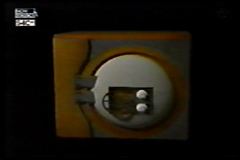 Can you unlock this safe? |
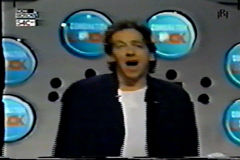 Host Ross King. |
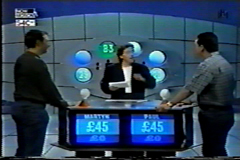 The set. |
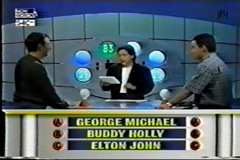 The answers to the question. |
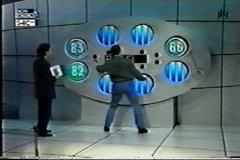 The not-so-good bonus game. |
This pilot has been viewed 14657 times since October 6, 2008 and was last modified on Dec 22, 2009 21:49 ET
Feedback? Contact me at usgs-pilot at the usgameshows dot net domain